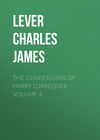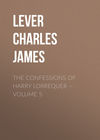Czytaj książkę: «The Daltons; Or, Three Roads In Life. Volume II», strona 35
CHAPTER XLI. THE END
With the sad episode which closes our last chapter we would fain let fall the curtain on this history. Very few words will now suffice to complete the narrative of those with whom we have so long sojourned. The discovery which revealed the murder of Mr. Godfrey restored Frank Dalton to the home and fortune of his family; and although the trying scenes through which he had passed made deep and dangerous inroads on his health, youth and hope, and the watchful care of Kate, restored him; and, after the lapse of some weeks, he was enabled to be about once more, recalling to the recollection of many the handsome figure and manly bearing of his father.
For many a year before, Corrig-O’Neal had not seen such a party beneath its roof, nor had those gloomy old walls echoed to such sounds as now were heard within them. In addition to Lady Hester, George Onslow, now a colonel, was the guest of the Daltons. Scarcely arrived in England, he quitted London at the moment when the tidings of his gallant achievements had made him the hero of the day, and hurried to see her who, through every change of his fortunes, had been the dearest object of his heart.
What tender reproaches, what heart-warm confessions, did those old woods hear, as, side by side, the lovers walked along, revealing the secret sorrows of the past, and recalling each incident which once had cheered with hope or shadowed with despair. But it is not in such company we would play the “eavesdropper,” nor watch for the changeful blushes of that soft cheek where tears of joy and grief are mingled. Neither would we care to accompany Grounsell, as with deeds and bonds, codicils and conveyances, he actually hunted poor Frank from place to place, urgently impressing on him the necessity for those “business habits,” the sad neglect of which had been the ruin of all the Daltons. As little inducement is there to follow Lady Hester, whose restless activity was interfering with every one and everything, taking the most lively Interest in the property the very moment it ceased to be her own, and devoted to all the charities which no longer could lay claim to being duties.
Pleasanter, perhaps, would it be to follow the old Count, as he sauntered alone for hours, trying to trace out in the long-forgotten scenes the stories of his boyhood. What pleasant reveries they were! – what glorious compensations for all the tumultuous passages of an eventful life! And so he felt them! And so he recognized with grateful heart the happy destiny which had befallen him, to close his days where he had begun them – in the midst of his own – loving and beloved.
And yet with such scenes and emotions we must not dally. Story-tellers, like Mother Carey’s chickens, have no sympathies with sunny skies and soft airs, – their province is amidst the hurricane and the storm. In truth, too, it is the very essence of tranquil enjoyment that it must be left to the imagination of each to conceive.
But one care weighed on all, and that was the absence of poor Nelly. Why was she not amongst them, to see their happiness, and heighten its enjoyment by all the benevolence of her kindly nature? It was true they were relieved of all anxiety regarding her by a letter which had followed them from Vienna, and which told how she had arrived in that city a few days after they had left it.
“I stood,” she said, “looking at the great palace where they told me Count Stephen lived, and could not bring myself to think it was not a dream that such as I should have business there! “I sat down on the steps of a church in front of it, and gazed for hours long at the great door through which you must have passed so often, and the windows which doubtless you stood at – perhaps thinking of poor Nelly! At last came Hanserl to say that he had obtained leave to see the palace; and oh, how my heart beat at the words, – for there was pride as well as humiliation in the thought, – and so we went in, and, crossing the great court, ascended the wide staircase. How beautiful it all was, those marble statues, – the rich frescos of the ceilings, – the gorgeous lamps, all emblazoned with armorial emblems; and yet I thought less of these than the polished steps which your feet had trodden, and which I could have kissed for your sake. “I had not imagined so much magnificence. You will smile, perhaps, at my simplicity, but so did not that kind old soldier with the wooden leg, who took such pains to show us everything. He was evidently pleased to witness our admiring wonder, and actually laughed at Hanserl’s enthusiasm for all those bright scimitars and shields of Turkish make, the horse-tailed banners, and other emblems of Austrian victory; while I stole away silently into a little chamber all hung with blue damask, over the mantelpiece of which was a portrait of our own dear Frank. How I felt that the room was yours, Kate, – how my heart told me each object you had touched, – and how they all became to my delighted senses like precious relics, revealing stores of affection laid up in your bosom, and showing a wealth of love I was not conscious of till then. Oh, no, dearest sister, I never knew, till then, how things without life themselves can be the links between beating hearts! I looked everywhere for a portrait of yourself, and it was only by asking the old corporal that I succeeded in finding it. ‘The Gräfin’s picture is in the Field-Marshal’s own room,’ said he, with pride, and led the way towards it. Oh, Kate, how beautiful – nay, it is Nelly, your own stern Nelly, who never flattered you herself nor could bear others to do so – it is Nelly, the same Nelly, unchanged, save in being less trustful, less impulsive, less forgiving than you knew her, and she tells you that at sight of such loveliness she stood wonderstruck and fascinated. Had you been really then before me, such as the picture represented, I had not dared to approach you; there was that of nobility and grandeur that had appalled my poor peasant heart, unused to the glitter of diamonds and the queenly air of high-born beauty; but, as I gazed on the likeness, long and steadily, this expression faded away, and, as though the lineaments were changing, I thought the eyes grew softer; they seemed to moisten, the lips trembled, the bosom heaved and fell, and it was you – you! as I had pressed you to my heart a thousand times – my own! my own! I know not what foolish words I may have uttered, nor to what excess my rapture carried me, but I was weeping bitterly as they led me away, – ay, bitterly, Kate; for such ecstasy as I felt finds its true vent in sorrow! But now I am happy once more, – happy that I have seen you and dear Frank, – happy that each of us in life has trodden the path that best became him! and so I came away, with many a lingering look, and many a backward glance, at what I was never to see again. “Here, in my mountain home, once more I can sit, alone, and think of you for days. You wander through all my thoughts, the characters of endless stories, in every imaginable vicissitude, and with every change of fortune; but throughout all, Kate – good and beautiful – truthful too, as you ever were. There, my tears have blotted out what I tried to say, nor dare I trust myself with more. My school children are already coming through the vineyard; I hear their song, – it was your own long ago: – ‘Da sind die Täge lang gennch, Da sind die Nachte milde.’ “Good-bye, good-bye, my sister – my dear sister.
“N. D. Meran.”
“Oh, let us hasten thither at once!” cried Kate, in rapture. “Oh, dear uncle, let us away to Meran.”
“Not till after Tuesday, Kate,” whispered George, passionately; and the words covered her cheeks with blushes as she heard them.
The reader knows now all that we care to tell him. Time was when story-tellers wound up with a kind wish that, “if they were not happy, that you and I may be.” Nor am I quite certain that we are wiser in our vocation than when those words were in vogue.
We are not vain enough to suppose that we have inspired an interest for any of those characters who have supported the minor parts of our drama. Should such good fortune have happily attended us, let us say, once for all, that Messrs. Haggerstone, Jekyl, and Purvis yet survive; that the Ricketts family are in excellent health, autograph gathering and duke courting, poetizing and painting, and pilfering, with all the ardor of youth, untouched by years and unrestrained by conscience. Lady Hester, too, is again living abroad, and, after trying three new changes of religion, is in treaty with a Heidelberg professor for a “spick-and-span” new faith, which will transcend everything hitherto known, and make even Mormonism ashamed of itself.
As for Prince Midchekoff, he and my Lady Norwood are the delight of a foreign city which shall be nameless, and their receptions nightly crowded by all the fashionable celebrities and distinguished visitors of that favored region.
THE END.



















